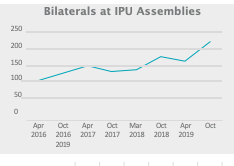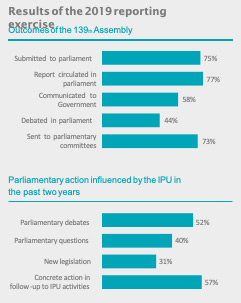Objective 5
Promote inter-parliamentary dialogue and cooperation
Objective 5 of the IPU Strategy is to promote inter-parliamentary dialogue and cooperation – true to our founding principles which saw the first IPU meetings take place as part of the peace movement in the late nineteenth century. IPU Assemblies continue this tradition by providing a unique opportunity for the global parliamentary community to come together, exchange good practices, and identify avenues for parliamentary action.
In 2019, we organized two successful Assemblies – in April in Doha, Qatar, and in October in Belgrade, Serbia. Both Assemblies enjoyed near record attendance – proof of the IPU’s continued convening power and testament to the legitimacy of the Assemblies’ outcomes as reflecting the views of the global parliamentary community. The participants rallied behind outcomes aimed at promoting peace, democracy and the rule of law, with a focus on sustainable development. On the sidelines of the official programme, there was a major increase in the number of bilateral meetings between delegations, again proof that the IPU is a key forum for parliamentary diplomacy.
Facilitating international parliamentary dialogue
The 140th IPU Assembly was held in April in Doha with over 1,500 delegates in attendance, including:
- MPs from 147 national parliaments
- over 110 Speakers and Deputy Speakers of parliament
- 8 Associate Members (regional parliamentary bodies)
- 37 Permanent Observers and other partner organizations.
During the Assembly, there were more than 170 IPU-facilitated bilateral meetings – an aspect of our Assemblies that has been steadily growing in importance over the years.
 Bilateral meetings give parliamentarians the chance to talk freely with their counterparts from around the world. These meetings are not restrained by protocol and help build bridges between countries and ease tensions at the parliamentary level.
Bilateral meetings give parliamentarians the chance to talk freely with their counterparts from around the world. These meetings are not restrained by protocol and help build bridges between countries and ease tensions at the parliamentary level.
The Assembly’s General Debate focused on how parliaments can promote education for peace, security and the rule of law. Dr. Rafael Yuste, from the Brain Research through Advancing Innovative Neurotechnologies (BRAIN) initiative, opened the debate in which close to 150 MPs from 115 Member Parliaments, including 52 Speakers, as well as representatives of a dozen partner organizations, contributed. Many of the good practices and recommendations were reflected in the final Doha Declaration.
The 141st IPU Assembly, held in Belgrade in October, was also well attended by:
- almost 85 per cent (149) of IPU Members
- 120 Speakers or Deputy Speakers of parliament
- 9 Associate Members (regional parliamentary bodies)
- 40 Permanent Observers and other partner organizations.
Setting a new record, the IPU facilitated over 230 bilateral meetings between national delegations.
“The IPU is an ideal platform for championing high values and fostering dialogue and cooperation for a peaceful and inclusive future.”
Mr. Nicholas Prea Speaker of the National Assembly, Seychelles
Highlights included a keynote address delivered by Mr. Lakhdar Brahimi, member of The Elders, at the opening of the General Debate on Strengthening international law: Parliamentary roles and mechanisms, and the contribution of regional cooperation. We also heard from 144 legislators from 110 Member Parliaments, including 52 Speakers and 15 young parliamentarians, as well as representatives of 10 partner organizations.
Outcomes and decisions
At each IPU Assembly, Member Parliaments adopt an emergency resolution on an urgent situation requiring immediate action by the international parliamentary community. The 140th Assembly adopted an emergency item calling for support for Mozambique, Malawi and Zimbabwe, hit by Cyclone Idai. The 141st Assembly adopted a proposal submitted by India on addressing climate change.
At the 141st Assembly in Belgrade, Members also adopted a landmark resolution calling for parliaments to take all legal and policy measures to achieve universal health coverage by 2030.
Other key outcomes from the 2019 Assemblies were resolutions on mercenaries and foreign fighters as a threat to peace, security and human rights; and the role of trade in achieving the SDGs.
Strengthening cooperation with other parliamentary organizations
In 2019 we pursued our efforts to make global parliamentary cooperation more consistent and effective.
We convened representatives of over 15 parliamentary organizations with Associate Member or Permanent Observer status on the sidelines of the 140th Assembly. This was a privileged space for dialogue and reflection on how to address common challenges effectively through regional and global parliamentary cooperation.
Cooperation was also the watchword of specialized events such as the IPU Regional Conference on Comprehensive Responses to Refugee Situations in follow-up to the adoption of the Global Compact on Refugees, hosted by the Pan-African Parliament from 11 to 13 November. We also co-organized an event on combating violence against women organized in collaboration with the Parliamentary Assembly of the Council of Europe on the occasion of the 41st session of the Human Rights Council in July in Geneva.
Monitoring implementation of IPU decisions and facilitating the exchange of good practices
The IPU annual reporting exercise allows us to collect information and concrete examples of action taken by national parliaments following IPU resolutions and decisions. Our 2019 surveys found that 75 per cent of parliaments who responded reported concrete action taken in follow-up to IPU outcomes and 31 per cent passed new legislation as a direct result of an IPU resolution.
 Examples of other follow-up actions to IPU decisions include:
Examples of other follow-up actions to IPU decisions include:
- Fiji: A guidance note was brought out on integrating the SDGs into the work of parliament.
- Japan and Kenya: New laws were adopted on gender parity.
- Jordan: A plenary session of parliament was held on youth participation in politics.
- Latvia: A Diaspora Law was enacted, and the Immigration Act was revised.
- Micronesia: The Parliament adopted a resolution making universal health coverage a national priority.
- Paraguay: New mechanisms were introduced for legislative monitoring of the SDGs.
- Seychelles: Environmental sustainability projects were launched in parliament.
- United Arab Emirates: A Future Committee was established in parliament.
- Uzbekistan: National human rights action plans were adopted by parliament.
Towards universal membership
In April 2019, Saint Vincent and the Grenadines became the 179th Parliament to join the IPU – showing steady progress towards our strategic goal of universal membership – and the Parliamentary Assembly of La Francophonie became our 13th Associate Member – as part of our emphasis on giving more space to parliamentary assemblies in order to generate and convey a coherent parliamentary message.
“The Legislative Assembly of Costa Rica applauds the efforts undertaken by the IPU to raise awareness not only of its defining values but also of its vision for the future through the exchange of best practice and experience among its Members.”
Ms. Zoila Volio Pacheco Deputy Speaker, Legislative Assembly, Costa Rica
We also continued engaging with non-member parliaments. In May, parliament clerks from non-members Belize and Kiribati accepted our invitation to join an information seminar on the structure and functioning of the IPU. In early December, we helped organize a regional seminar on achieving the SDGs in the Caribbean Region in Port of Spain, Trinidad and Tobago. The Parliament of Barbados attended the seminar and its representatives requested information on the membership procedure.
 MPs attend the October 2019 IPU Assembly in Belgrade. © IPU/ Serbian Parliament
MPs attend the October 2019 IPU Assembly in Belgrade. © IPU/ Serbian Parliament
Case study
Reaching out to Spanish-speaking Members
The IPU held its first regional information seminar in Latin America on the functioning of the organization. The seminar was held in San José, Costa Rica, on 27 and 28 November 2019 in partnership with Costa Rica’s Legislative Assembly. Participants included senior staff from 11 countries: Argentina, Colombia, Costa Rica, Cuba, Dominican Republic, Ecuador, Guatemala, Paraguay, Suriname, Uruguay and Venezuela. The IPU annual seminar for parliamentary staff is normally held at IPU Headquarters in Geneva in either English or French. Participation from Latin American parliaments has traditionally been low, mainly because of the geographical distance and language considerations. In an effort to strengthen ties with these parliaments, the IPU took the seminar to Latin America, with a complete programme in Spanish.